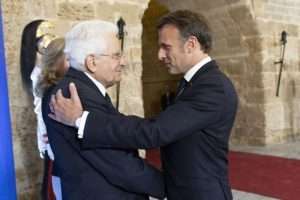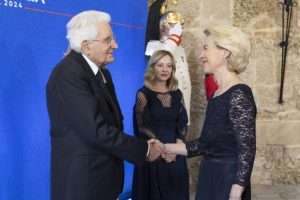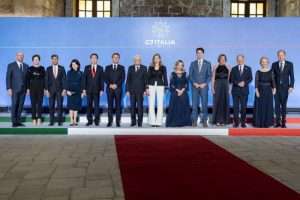An unprecedented presidency like that of Sergio Mattarella and the first premiership of a woman, and a young one at that, like Giorgia Meloni, show that, despite the diversity, cooperation and respect for roles and forms among the highest offices of State produce important results for the country
by Guido Talarico
The provincial gaze of a certain domestic press has missed the deeper political meaning of this G7 underway in Puglia. In international economic and financial circles and in some chancelleries, however, referring to Italy they speak of a ‘Tier 1 summit’, borrowing the definition of the highest quality capital from banking jargon. The reason for this very favourable opinion of a country long considered unstable and often unreliable, has quite irrefutable reasons.
The first element is the Quirinal. Sergio Mattarella has led this country with wisdom and balance since 2015. Nine years characterised by many crises and the usual alternation of governments that the President of our Republic has always faced and overcome with the effectiveness of the jurist, who finds in the Constitution an infallible guide, and of the Catholic, who always prefers strongly ethical choices.
It is no coincidence that in his speech before the Gala dinner, President Mattarella, speaking about the role of the G7, explained that the group ‘is a group of countries united not only by a high level of development and income, but also and above all by values. Values that have significantly promoted the dignity of people and peoples, based on the UN Charters and Declarations. Values, goals, rules, which must be preserved and developed in the new condition of international life. The summit has thus been transformed from a forum for economic coordination into a platform for relevant debate on the major issues of the present day’.
Giorgia Meloni, for her part, fits right into this groove. She has a very different personal and political history from Mattarella, but she too has a sense of institutions and great administrative pragmatism. Without ever denying her roots and her path, the first woman Prime Minister of Italy also in this G7 demonstrates, despite her young age, that she has much more stuff than many of her predecessors and a rare political flair to which she adds over time a greater attention to the formal aspects of politics and institutions.


Finally, I would like to add one last element, which is also too often overlooked, and which makes ours a more important country than we ourselves tend to evaluate. I am referring to the Vatican. The presence of Pope Francis in Apulia reminds the world that the seat of Christianity is Rome, not Washington or even Paris. Inviting him to attend was another happy intuition of Palazzo Chigi that the Pope, being the great communicator that he is, fully grasped.

(Associated Medias) – Tutti i diritti sono riservati


